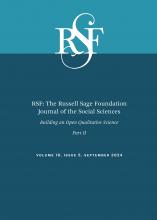Research Article
Open Access
Making Sense of Health-Related Labor-Market Exits and Disability: Evidence from the American Voices Project
James Hiebert, Lillian Kahris, Kristin Seefeldt
RSF: The Russell Sage Foundation Journal of the Social Sciences September 2024, 10 (5) 66-83; DOI: https://doi.org/10.7758/RSF.2024.10.5.03
James Hiebert
aResearch assistant at Poverty Solutions at the University of Michigan
Lillian Kahris
bProject director at the Western New York Area Labor Federation, AFL-CIO, United States
Kristin Seefeldt
cAssociate professor of social work at the University of Michigan, United States

REFERENCES
- ↵
- Abramson, Corey M.,
- Zhoufan Li,
- Tara Prendergast, and
- Martín Sánchez-Jankowski
- ↵
- Adler, Jonathan M.,
- Ava Lakmazaheri,
- Eamon O’Brien,
- Alison Palmer,
- Micah Reid, and
- Elizabeth Tawes
- ↵
- Beechey, Susanne N
- Blattner, Charlotte E
- ↵
- Bogart, Kathleen R.,
- Adena Rottenstein,
- Emily Lund, and
- Lauren Bouchard
- ↵
- Bogart, Kathleen R.,
- Nicole Rosa, and
- Michael L. Slepian
- ↵
- ↵
- Casselman-Hontalas, Amy,
- Dominique Adams-Santos, and
- Celeste Watkins-Hayes
- ↵
- Centers for Disease Control and Prevention
- ↵
- Center for Retirement Research
- ↵
- Charmaz, Kathy
- ↵
- Colorafi, Karen,
- Laura Cupples,
- Davi Kallman, and
- Jae Kennedy
- ↵
- Conrad, Peter
- ↵
- Damaske, Sarah
- ↵
- ↵
- Deitz, Richard
- ↵
- Dorfman, Doron
- ↵
- Edin, Kathryn J.,
- Corey D. Fields,
- David B. Grusky,
- Jure Leskovec,
- Marybeth J. Mattingly,
- Kristen Olson, and
- Charles Varner
- ↵
- Fang, Albert H., and
- Gregory A. Huber
- ↵
- ↵
- Flores Morales, Josefina
- ↵
- Forber-Pratt, Anjali J.,
- Dominique A. Lyew,
- Carlyn Mueller, and
- Leah B. Samples
- ↵
- Gilens, Martin
- ↵
- Goffman, Erving
- ↵
- Grue, Jan
- ↵
- Hansen, Helena,
- Philippe Bourgois, and
- Ernest Drucker
- ↵
- Heller, Tamar, and
- Lieke van Heumen
- ↵
- Kalleberg, Arne
- ↵
- Katz, Michael B
- ↵
- Kojola, Erik, and
- Phyllis Moen
- ↵
- Link, Bruce G., and
- Jo C. Phelan
- ↵
- Lopez, Andrea M.,
- Megan Comfort,
- Christina Powers,
- Alex H. Kral, and
- Jennifer Lorvick
- ↵
- Major, Brenda,
- John F. Dovidio,
- Bruce G. Link, and
- Sarah K. Calabrese
- ↵
- Munnell, Alicia,
- Wenliang Hou, and
- Geoffrey Sanzenbacher
- ↵
- ↵
- Neubeck, Kenneth J., and
- Noel A. Cazenave
- ↵
- O’Leary, Paul,
- Leslie Boden,
- Seth A. Seabury, and
- Ethan Scherer
- ↵
- Oliver, Mike
- ↵
- Pryma, Jane
- ↵
- Rabinovich, Lila
- ↵
- Riessman, Catherine K
- ↵
- Scott, Marvin B., and
- Stanford M. Lyman
- ↵
- Shakespeare, Tom
- ↵
- Smart, Julie F
- ↵
- ↵
- Social Security Administration
- ↵
- ↵
- Szinovacz, Maximiliane E., and
- Adam Davey
- ↵
- Titchkosky, Tanya
- ↵
- U.S. Bureau of Labor Statistics
- ↵
- Watkins-Hayes, Celeste, and
- Elyse Kovalsky
- ↵
- Whittle, Henry J.,
- Kartika Palar,
- Nikhil A. Ranadive,
- Janet M. Turan,
- Margot Kushel, and
- Sheri D. Weiser
- ↵
- Winance, Myriam
In this issue
Making Sense of Health-Related Labor-Market Exits and Disability: Evidence from the American Voices Project
James Hiebert, Lillian Kahris, Kristin Seefeldt
RSF: The Russell Sage Foundation Journal of the Social Sciences Sep 2024, 10 (5) 66-83; DOI: 10.7758/RSF.2024.10.5.03
Jump to section
Related Articles
- No related articles found.
Cited By...
- No citing articles found.





